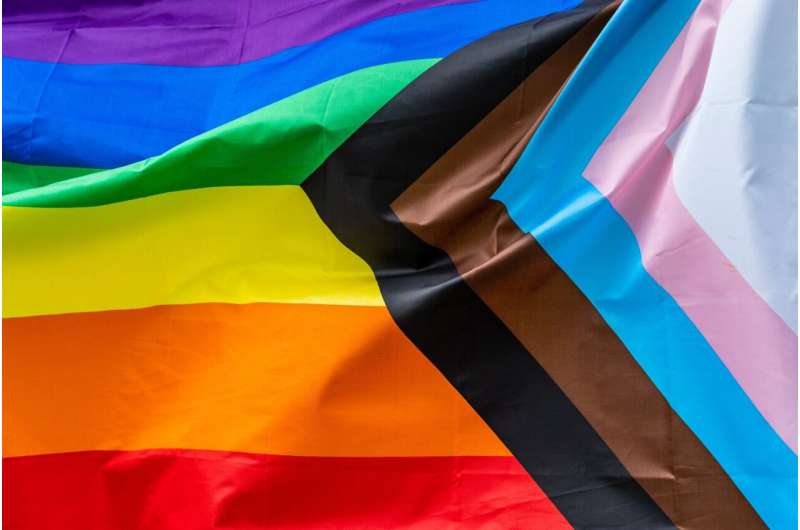This article has been reviewed according to Science X's editorial process and policies. Editors have highlighted the following attributes while ensuring the content's credibility:
fact-checked
trusted source
written by researcher(s)
proofread
New research reveals just how few LGBTQI+ people play sports

The topic of homophobia in sport has recently made headlines in Australia, with a series of homophobic incidents involving men's AFL players.
These homophobic incidents are usually well-reported in news media, but research has rarely explored the impact on participation for LGBTQI+ people.
Fresh research into the problem
Our new research is one of the first pieces of academic research in Australia to document how many LGBTQI+ people play and engage with sport. We also explored current levels of discrimination across sport in Australia, and the barriers and enablers of participation for young LGBTQI+ people.
Our research focused specifically on LGBTQI+ people aged 16–25 across community sport and movement settings (including gyms and leisure spaces).
Previous research has shown young LGBTQI+ people are targeted with homophobia and transphobia in school and youth sport environments, and this affects them in several ways.
Specifically, it affects their mental health, with an increased risk of depression and anxiety, and forces them to drop out of sport—with many choosing to not play sport as adults.
The decline of LGBTQI+ youth participation
Our research showed 47% of LGBTQI+ youth were registered to a sports club between 2019 and 2022. Then, in 2023, just 33% of our sample said they currently participate in some form of competitive sport.
Comparable data from AusPlay show around 60% of young people across the broader population play sport.
Within different segments of the LGBTQI+ community, our data show just 31% of gay men and 29% lesbians play competitive sport, and even fewer within trans and gender diverse groups.
Therefore, our data support previous research from the United States that show young LGBTQI+ people engage with sport at half the rate of non-LGBTQI+ youth.
Trying to find a reason why
There is often much discussion within media about why there are very few openly gay men in professional sport. Our data highlight one of the reasons—gay men are less likely to play sport in the first place.
Some of the key barriers identified by participants were a lack of safe spaces, negative or traumatic early experiences, and discrimination.
Of those participants who do play sport, only 49% openly share their LGBTQI+ identity with teammates and coaches.
Ongoing discrimination is a key driver of why LGBTQI+ youth disengage from playing sport, and a reason why young people reported little-to-no sense of belonging within sports environments.
Some improvements seen but not for gay men
Overall, our research showed 53% of LGBTQI+ youth have witnessed discrimination (through homophobia, biphobia or other transphobia), and 40% have experienced discrimination.
These levels of discrimination show some marked improvement since the last major study in 2014 exploring homophobia in Australian sport, in which about 80% of respondents reported witnessing homophobia.
This suggests increased efforts to promote inclusion for LGBTQI+ people in sport is having a positive impact.
However, our data showed 76% of gay men have witnessed homophobia in sport, which shows little marked improvement in a decade.
Across our focus groups, young people spoke of negative early experiences in school sport, and the negative effects of ongoing debates related to LGBTQI+ issues in sport (such as trans athlete bans, or participation in pride games).
Most striking across our focus groups was the desire for young people to be able to be themselves when playing sport and "just exist."
The notion of having freedom and to not have their identity challenged, questioned, ridiculed or invalidated while navigating sporting spaces was discussed extensively.
Hopes for the future
Young people discussed the ways in which sport organizations could work towards making them feel safer and included.
They also had strong views towards pride efforts, raising issues with "rainbow washing," a lack of engagement with LGBTQI+ communities, and minimal commitment to addressing discrimination.
One young person in our study expressed:
"I would like to see a little bit more effort, instead of chucking us in a box saying 'it's too difficult to work out.' 'We're going to include you' would be a good next step. But I think a lot of work needs to be done to feel welcomed again."
Our data show targeted efforts and programs are urgently needed to ensure sport and movement settings do not continue to cause harm and force LGBTQI+ youth to drop out from sport.
Additionally, the data raise significant challenges for the broader sport sector and its ongoing sustainability.
Every sport wants new players and fans, but the sport sector risks losing a whole generation of young people unless it fully commits to reducing and eradicating discrimination towards LGBTQI+ people.
This work should also complement and sit alongside other important work addressing gender-based violence, and work addressing backlash to feminism and gender equity among teenage boys in schools.
Sport organizations must take immediate steps to ensure their environments are fully inclusive of LGBTQI+ people.
This can be done through good policy development and effective implementation, anti-homophobia initiatives and campaigns, and engaging LGBTQI+ sport communities.
Provided by The Conversation
This article is republished from The Conversation under a Creative Commons license. Read the original article.![]()





















